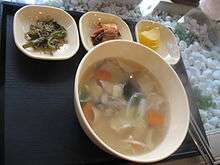Sujebi
| Sujebi | |
 Sujebi with banchan | |
| Korean name | |
|---|---|
| Hangul |
수제비 (or) 밀가루뜨더국 |
| Hanja | derived from 手摺 |
| Revised Romanization |
sujebi (or) milgaru ddeudeoguk |
| McCune–Reischauer |
sujepi (or) milgaru ttŭdŏkuk |
Sujebi (Korean pronunciation: [sʰudʑebi], South Korea) or milgaru ddeudeo guk ([milɡaɾu t͈ɯːdʌɡuk], North Korea) is a Korean traditional soup consisting of dough flakes roughly torn by hand, with various vegetables. The flavor and recipe resemble kalguksu, except that the latter is made with noodles rather than wheat flakes. It is commonly considered a dish to consume on rainy days, along with bindaetteok.
The broth for sujebi is usually made with dried anchovies, shellfish, and kelp. In order to obtain a rich, umami flavor, the ingredients should be simmered for many hours. Added to this broth are soft noodles and various vegetables or kimchi, most often zucchini and potatoes.
Origin
Korean people began to eat sujebi and guksu (국수 noodles), both dishes made of wheat flour, from the early Goryeo period (935~1392), but the name sujebi (earlier sujeop-eo) dates from the mid Joseon period. Sujeop-eo is a combined hanja word comprising the terms su (hanja: 手; hangul: 수; literally "hand") and jeop (hanja: 摺; hangul: 접어 or 접다; literally "folded" or "folding").
From the Joseon period, people started making various types of sujeobi according to various purposes. Sujebi is today considered a typical commoner's food, but in the past, it was relatively rare and used for special occasions especially janchi (잔치; feast, banquet) such as dol janchi (the celebration of a baby's first birthday).
In North Korea, sujebi is called milgaru ddeudeo guk (밀가루뜨더국), which is the words comprising three words: milgaru (밀가루; literally "wheat flour") + ddeudeo (뜯어; literally "tearing" or "torn") guk (국; literally "soup").
The names of sujebi vary according to regions in Korea. [1]
| Region or cities | Name | Korean name |
|---|---|---|
| North Korea | milgaru ddeudeo guk | 밀가루뜨더국 [2] |
| Gyeonggi-do and Gangwon-do | ddeudegi or ddedeokguk | 뜨데기 or 뜨덕국 |
| Jeollanam-do | ddeoneonjuk or ddiyeonjuk | 떠넌죽 or 띠연죽 |
| Gyeongsangnam-do | sujibi, miljebi, or milkkarijang guk | 수지비, 밀제비, or 밀까리장국 |
| Yeocheon and Bongwha | dabureong juk or beongeuraegi | 다부렁죽 or 벙으래기 |
See also
References
- ↑ (Korean) 수제비의 사투리, 다부렁죽과 떠넌죽 그리고 벙으래기 from Ohmynews.com
- ↑ (Korean) 육수가 개운한 수제비
External links
- Brief information and recipe of Spinach and Carrot Sujebi
- The Korean people's food, Sujebi from Chosunilbo
- Information about “Samcheongdong Sujebi” from Korea Tourism Organization
- (Korean) Introduce of heuk sujebi
- (Korean) Brief information about sujebi from m@ttara.co.kr